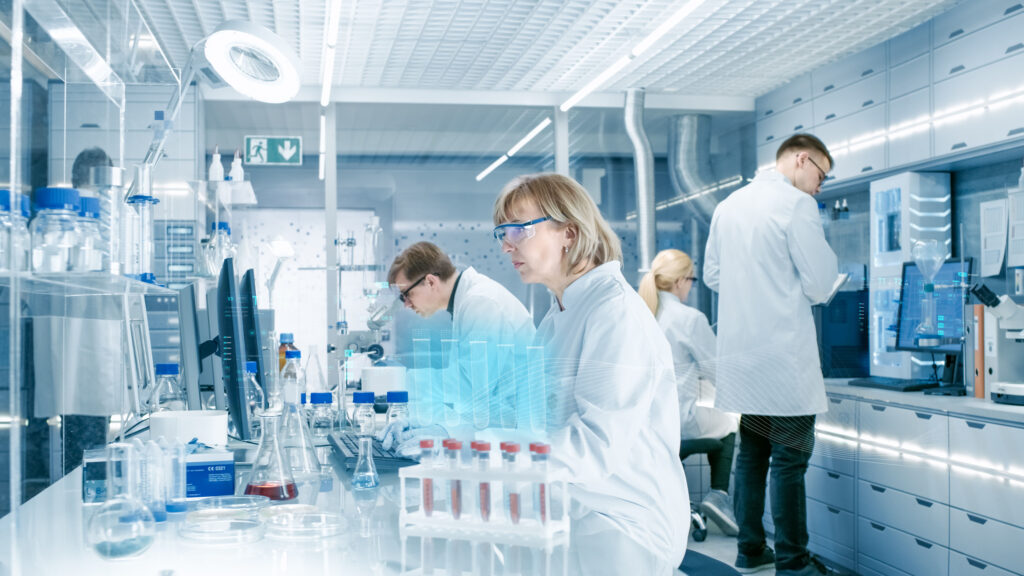The life sciences industry is undergoing tremendous change in light of the unprecedented events in recent years – providing a catalyst for change and presenting opportunities for innovation, but also challenges for those lacking in technological capabilities. As many manufacturers discovered, the use of legacy, disparate and siloed manufacturing systems are incapable of holistically addressing today’s business needs. Now, the expectation to deliver better products and services at an increasingly fast pace must be met through agile, flexible and sustainable manufacturing operations and execution—powered by digital transformation.
In an effort to strive for manufacturing excellence, many manufacturers are starting transformation initiatives in different areas of industrial engineering software or the supply chain. But few have addressed the transformation of their shop floors with a common approach to eDHR a modern manufacturing execution system (MES) software. A strong MES/ MOM environment on the shop floor is at the heart of digital transformation as this is where the product, business and operational functions of the enterprise intersect.
Here, we explore the challenges and trends that drive the digital transformation of life sciences companies, as well as how MOM can efficiently facilitate it.

The Challenges and Trends in Life Sciences Manufacturing
On top of increasing global change, disruptions in the technology sphere are amplifying the challenges for manufacturers in life sciences, including:
- Increased demand complexity and variability, requiring more flexible lines and optimized performance
- Being first-to-market in New Product Introduction and Mastering Tech Transfer processes
- Rising price pressure in healthcare and increased regulatory constraints across diverse markets and a desire for a common approach to eDHR
- Delivering one-of-a-kind, high quality medical devices to ensure patient safety
This, in turn, raises the urgency for companies to look into modern manufacturing solutions in order to address these challenges and act on the following growing industry trends to ensure resiliency and business continuity.
- Manufacturing technology breakthroughs: Newer, more efficient tools, machinery and software are now being used to manage the manufacturing operations of more complex products.
- Local production of medical products: The global demand for more affordable, accessible medical care comes with a need to produce locally in order to reduce costs, simplify processes and shorten delivery times.
- Intense competition between CMOs and medical device manufacturers: Medical device companies (i.e., OEMs) and Contract Manufacturing Organizations (CMOs) are racing to offer more varied product lines and reliable manufacturing capabilities.
- Regulatory pressure from manufacturing inspections: Medical device product designers must not only create innovative solutions but also navigate an increasingly challenging regulatory environment of validation and eDHR requirements.
- Expectation of sustainability for medical device manufacturers: To improve market share, medical device companies must be able to differentiate themselves as a responsible, sustainable entity.
In order to address these trends while overcoming the industry’s challenges—without impacting cost or quality—life sciences manufacturers must gain the necessary visibility and control over the shop floor and unlock efficient collaboration across the value network. This is where MOM comes into the picture.
MOM: A Low-Risk, High-Value Starting Point for Digital Transformation
In essence, MOM enables manufacturers to break through the limitations of traditional manufacturing execution systems (MES). It involves automating, executing and managing the performance of all business processes relevant to manufacturing execution, including manufacturing production management software, quality, warehousing, the workforce and maintenance.
Starting with a MOM implementation can prove to be a low-risk, high-value entry point for digital transformation as it can help manufacturers simultaneously maintain high levels of throughput, quality and customer service while creating opportunities for sustainable innovation. This happens through the digitalization of the shop floor environment for improved performance, a competitive edge and better disruption management.
For resilient, future-proof operations, life sciences companies need a connected, scalable and sustainable platform approach tailored to their business needs—one that is collaborative on a global scale, model based and bound only by the imagination and creativity of their employees. That is the definition of the DELMIA Manufacturing Operations Management (MOM) software.
Powered by the 3DEXPERIENCE platform, the DELMIA MOM solution digitalizes the entire life science manufacturing process—from design to build to support—giving life sciences manufacturers the ability to better control and synchronize their operations as a global, best-in-class enterprise. Our solution supports multiple manufacturing models from discrete to process and is scalable from the largest of factories to small, niche manufacturers—with an emphasis on business process management, unique global management capabilities and robust data collection from any IIoT device. Ultimately, DELMIA MOM creates a foundation for digital transformation that is unified, flexible, secure and provides real-time availability to critical manufacturing data for responsive decision-making, resulting in improved agility and expanded continuous improvement across the enterprise and extended global supply chain.
Read our eBook to learn more about how DELMIA’s manufacturing operations management solution can help your life sciences organization drive profitable growth, operational efficiency and greater levels of innovation, sustainably.

